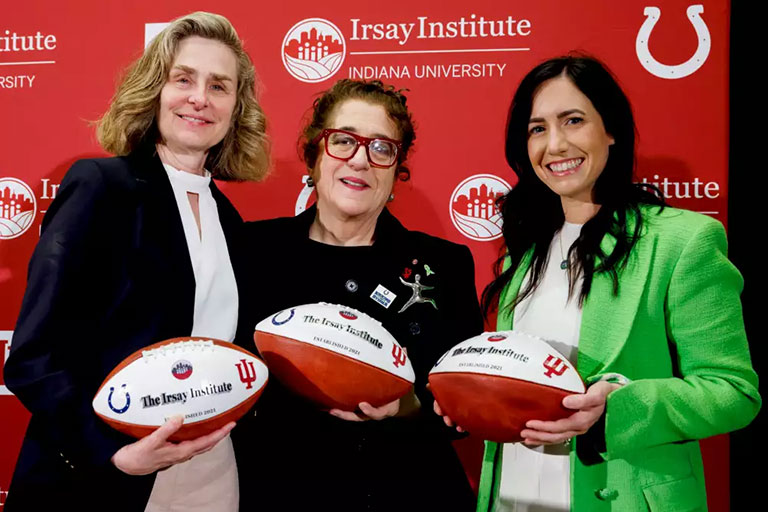At the forefront of critical social, political and economic issues important to Hoosiers, IU researchers and students are engaged in multidisciplinary initiatives throughout the state. Striving to better understand and find solutions in many key areas involving race, gender, class, health, justice and more, IU researchers are working to strengthen Indiana’s communities.
Revealing how society works
Featured stories

Belonging exercise improves college students’ academic persistence
Students who participated in an online belonging exercise completed their first year as full-time college students at a higher rate than their peers
Read about the exercise

New institute addresses stigma around mental health
Thanks to the Jim Irsay family, a new insititute is to become a leading national center for addressing the stigma surrounding mental illness and other health issues such as HIV, epilepsy, cancer, dementia and addiction.
Read more about the institute
Preventing overdose deaths
IU researchers are working to reduce opioid deaths in Indiana by providing timely data to improve resources and services that help people who use drugs stay as healthy as possible.
Learn about the projectSocial Science research by the numbers:
73research projects were supported by IU's Racial Justice Research Fund
#2ranking for IU’s O’Neill School of Public and Environmental Affairs on U.S. News & World Report’s list of best public affairs programs
75years of ground breaking research on sexual health and human sexuality through the Kinsey Institute
Everyone plays a role in ending stigma in our society
Stigma -- a mark of disgrace associated with a particular circumstance, quality, or person -- can be one of the primary barriers to seeking treatment and support for mental health issues, substance use disorder and other health issues. At Indiana University, we are committed to addressing this issue.
Learn more about our "A Conversation With ..." campaign, which brings together famous IU visitors, students, faculty and staff, who are sharing their own personal stories in an effort to put an end to stigma.
Description of the video:
[Animation: fade in image of Indiana, text: Empowering Indiana's Nurses of Color for Health Policy Leadership, and three quarters crimson box around text on screen]
[Audio: Sharron Crowder speaks on camera] [Music fades in]
In Indiana, our nurses of color represent only 10 percent of all of the registered nurses. And
[Animation: fade to white transition, Lower third: IU logo with text Sharron Crowder, PhD, Clinical Associate Professor of Nursing fades in and fades out] [Video: Sharron Crowder sits in an office talking to camera]
when we look at that small
[Video: Nurses organizing items in nursing classroom][Audio: Sharron Crowder speaks off camera]
number, we recognize that we have even less nurses of color who are involved in health policy
[Video: Sharron Crowder sits in an office talking, Sharron Crowder speaks on camera]
and advocacy. In January of
[Video: Three professionally dressed women of color walking in Indiana capitol building, Sharron Crowder speaks off camera]
2021, we launched a program that's called Empowering Nurses of Color for Health Policy
[Video: Sharron Crowder sits in an office talking, Sharron Crowder speaks on camera]
Leadership. Think about the missed opportunity we have when we
[Video: dolly out of Sharron Crowder sitting at a round table talking with two other professional women of color, Sharron Crowder speaks off camera]
don't have these nurses of color at the table
[Video: Sharron Crowder sits in an office talking, Sharron Crowder speaks on camera]
to be able to contribute to solutions because
[Video: Nurse and Cohort member speaking in nursing classroom, Sharron Crowder speaks off camera]
they know the issues, they live them.
[Video: Sharron Crowder sits in an office talking, Sharron Crowder speaks on camera]
This cohort of nurses represent nurses
[Video: Still image of nurses of color on a zoom call, Sharron Crowder speaks off camera]
throughout the state of Indiana
[Video: Still image of nurses of color on a zoom call, Sharron Crowder speaks off camera]
who have the expertise, who have the leadership skills, they have the day-to-day
[Video: Sharron Crowder sits in an office talking, Sharron Crowder speaks on camera]
commitment, working and engaging with patients of
[Video: dolly in of instructor teaching nurses over a dummy in a hospital bed, Sharron Crowder speaks off camera]
all different ages and then with their families
[Video: Sharron Crowder sits in an office talking, Sharron Crowder speaks on camera]
to enhance, to improve health care. [Shandra Burton speaks off camera] I've had mentors before,
[Video: Shandra Burton speaking to colleague in classroom setting]
but this program was special because I had a mentor that looked like me, and I think that's a valuable thing.
[Video: Shandra Burton sits in front of a window looking outside talking to interviewee, Shandra Burton speaks on camera] [Animation: IU logo with text Shandra Burton, 2021 Nurse Cohort Member fades in and fades out]
You start this journey, and you think that you're alone,
[Video: dolly in of Shandra Burton sitting at a round table in an office talking with a family of three other women of color, Shandra Burton speaks off camera]
but there's other people that have the same interests, the same focus, and we just need to have these
[Video: Shandra Burton sits in front of a window looking outside talking, Shandra Burton speaks on camera]
platforms to bring us all together.
[Video: Shandra Burton sits at table speaking with elder woman about a form, Shandra Burton speaks off camera]
And I hope to be able to utilize what I've
[Video: Shandra Burton stands Infront of a classroom giving a lecture, Shandra Burton speaks off camera]
learned with my students now and in the future because they are the future of health care.
[Video: Shandra Burton sits at table speaking with elder woman about a form, Shandra Burton speaks off camera]
[Johnathan Liechty speaks off camera]
This program has helped me
[Video: dolly in of Johnathan Liechty speaking from a desk]
tremendously in my role as a board member for the federally-qualified health center in my community.
[Video: Johnathan Liechty sits in an office space in front of a glass wall speaking to interviewee, Johnathan Liechty speaks on camera] [Animation: IU logo with text Johnathan Liechty, 2021 Nurse cohort member fades in and out]
It's helped me to
[Video: Johnathan Liechty speaks with nurse in a nursing classroom, Johnathan Liechty speaks off camera]
be more familiar with
[Video: Johnathan Liechty sits in an office space in front of a glass wall speaking, Johnathan Liechty speaks on camera]
current legislation that's impacting
[Video: high angle of Johnathan Liechty sits at a table talking with his hands over a piece of paper, Johnathan Liechty speaks off camera]
our communities of color. And so, it's helped us
[Video: Johnathan Liechty speaks with nurse in a nursing classroom over a practice patient dummy, Johnathan Liechty speaks off camera]
with some of our decisions and some of our strategic planning.
[Video: Johnathan Liechty speaks with to person off camera in an office setting, Johnathan Liechty speaks off camera]
It is so important to get nurses of color
[Video: Johnathan Liechty speaks with nurse in a nursing classroom over a practice patient dummy, Johnathan Liechty speaks off camera]
involved in health care advocacy because
[Video: Johnathan Liechty sits in an office space in front of a glass wall speaking, Johnathan Liechty speaks on camera]
we are the voice for sometimes those that
[Video: Camera circles around Johnathan Liechty and nurse in receptionist area of an office, Johnathan Liechty speaks off camera]
may not be represented.
[Video: Johnathan Liechty sits in an office space in front of a glass wall speaking, Johnathan Liechty speaks on camera]
We can provide perspective,
[Video: Johnathan Liechty speaks with nurse in a nursing classroom with a practice patient dummy in the background, Johnathan Liechty speaks off camera]
we can provide nuance
[Video: Johnathan Liechty sits in an office space in front of a glass wall speaking, Johnathan Liechty speaks on camera]
to many decisions that
[Video: dolly in of Johnathan Liechty speaking to a person off camera from a table in an office setting, Johnathan Liechty speaks off camera]
impact our communities of color.
[Video: Johnathan Liechty sits in an office space in front of a glass wall speaking, Johnathan Liechty speaks on camera]
[Sharron Crowder speaks off camera]
We are part of a university system that's
[Video: Outside of the IU Nursing school building with words reading Indiana University School of Nursing on the façade]
dedicated to preparing
[Video: Sharron Crowder sits in an office talking, Sharron Crowder speaks on camera]
nurses who are a vital part of the healthcare
[Video: Shandra Burton sits at table speaking with three woman about a form, Sharron Crowder speaks off camera]
workforce. We're layering on
[Video: Shandra Burton sits at table in an office speaking about a form, Sharron Crowder speaks off camera]
the exposure and the preparation
[Video: Sharron Crowder sits in an office talking, Sharron Crowder speaks on camera]
for engaging in policy decision-making
[Video: Sharron Crowder sits at a round table speaking with two other professionally dressed women of color, Sharron Crowder speaks off camera]
and advocacy. We cannot forget that they
[Video: Sharron Crowder sits in an office talking, Sharron Crowder speaks on camera]
advocate for patients and families on a day-to-day basis, they advocate
[Video: dolly in of Johnathan Liechty speaking in front of student off camera in a nursing classroom, Sharron Crowder speaks off camera]
for patient populations, and they advocate for
[Video: Shandra Burton sits at table in an office speaking with three women of color, Sharron Crowder speaks off camera]
key issues affecting Indiana. And so
[Video: Three professionally dressed women of color walking in Indiana capitol building, Sharron Crowder speaks off camera]
why not expand, and to broaden, to know that when we look around, that we have the inclusion, and we have
[Video: Sharron Crowder sits in an office talking, Sharron Crowder speaks on camera]
nurses of color who are vital
[Video: Camera circles around Johnathan Liechty and nurse in receptionist area of an office, Sharron Crowder speaks off camera]
on the front lines,
[Video: Close up shot of student male nurse working, Sharron Crowder speaks off camera]
then provide quality care.
[Video: Johnathan Liechty speaks with nurse in a nursing classroom demonstrating over a practice patient dummy, Sharron Crowder speaks off camera]
And let's bring their
[Video: Shandra Burton stands Infront of a classroom giving a lecture, Sharron Crowder speaks off camera]
voices. Let's bring their expertise.
[Animation: cross fade] [Video: Shandra Burton and two other professional women of color walk outside of the US capitol building]
Let's bring their leadership. Because we all want a better Indiana.
[Animation: cross fade] [Video: Sharron Crowder sits in an office talking, Sharron Crowder speaks on camera]
[Video: fade to black, IU logo, Indiana University, research.impact.iu.edu fade in and out][Music fades out]

